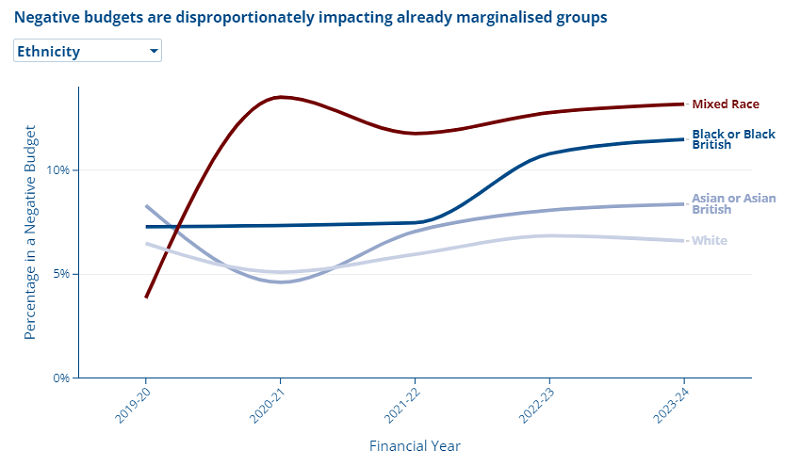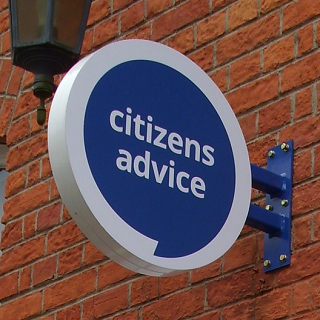Britain is facing its biggest cost-of-living crisis in decades.
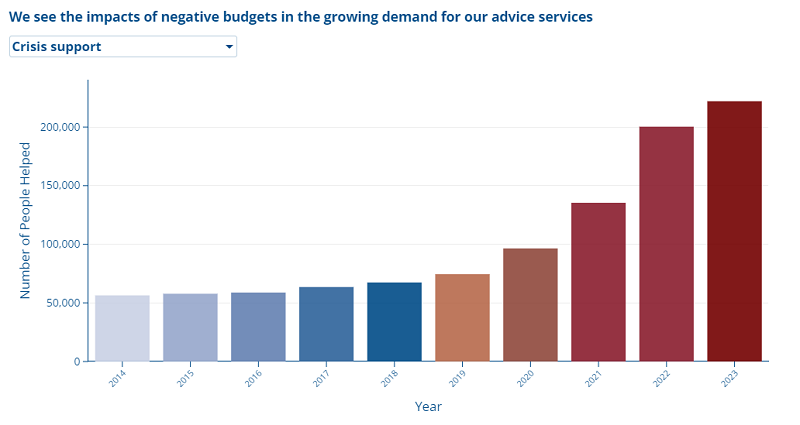
At Citizens Advice, we've helped more people than ever before who can't afford to cover essential costs - like food, energy and housing.
Last year, Citizens Advice
sounded the alarm that half the people we help with debt are in a negative budget - where even after expert advice, they have more going out than coming in. Now, we’re able to provide a comprehensive analysis of the scale and impact of negative budgets for millions of struggling households. The
National Red Index, a groundbreaking new report from Citizens Advice shows us what negative budgets look like on a national scale
[1]:
- 5 million people, including 1.5 million children, are in a household with a negative budget.[2]
- Another 2.35 million people are living on empty - they’re only escaping a negative budget by cutting their essential spending back to unsafe levels.
- Negative budgets are more widespread amongst already marginalised groups, including:
- 1 in 5 single parent households
- 1 in 4 households receiving Universal Credit
- Nearly 1 in 10 households with a disabled person
- 13% of mixed race households and 11% of Black and Black British households
- The problem is deepening - the average monthly deficit for a negative budget household has gone from -£270 in 2019/20 to -£365 in 2023/24.
- Without government action, we expect that over 250 people will fall into a negative budget every day in the run up to the General Election.
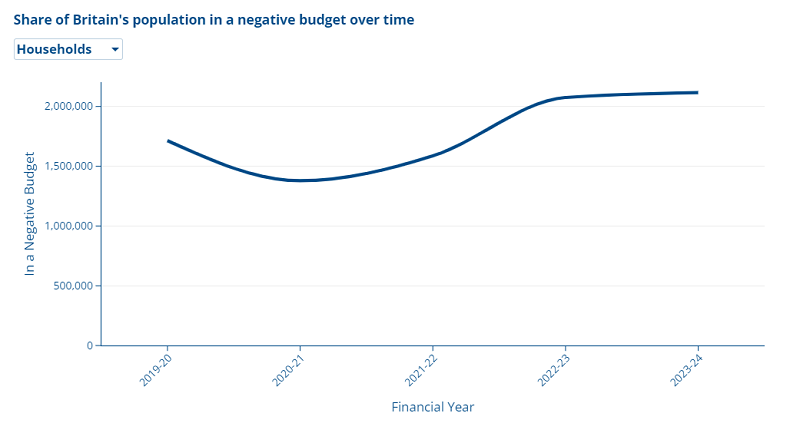
In
Wiltshire around 1 in 20 people are in a negative budget.
- What does it mean to be in a negative budget?
Someone is in a negative budget when their essential expenditure is higher than their income, leaving them out of pocket each month just from key living costs.
At Citizens Advice, we’re seeing a spiralling number of clients struggling with a negative budget, where their income doesn’t cover essential spending. This isn’t a problem that clever budgeting can overcome. No matter what they - or our expert advisers - do, they can’t afford their bills for basics like housing, energy and food.
But this isn’t just a problem for the people we see through our service. The National Red Index combines our detailed budgeting data from more than 300,000 people who have come to us for debt advice with national survey data from the ONS, which reveals an extremely alarming picture of household finances across Britain.
Nearly 5 million people are in a negative budget, stuck in the red, building up debt to get by. A further 2.35 million are living on empty - only escaping a negative budget by cutting their essential spending back to unsafe levels, just to keep their heads above water. They’re breaking even, but only by going hungry, sitting in cold and damp homes, or not getting around as much as they used to.
Marginalised groups are the worst affected. Disabled people, racially minoritised groups, single parents, and people receiving Universal Credit, have some of the highest negative budget rates and the deepest deficits. If things continue as they are, we’ll see these groups who already often experience multiple disadvantages held back further.
- What’s driving negative budgets?
The following issues are persistently part of the picture when it comes to negative budgets:
- Income from benefits hasn’t kept pace with the true cost of living. If benefits had increased with the Household Costs Indices (HCI) measure of inflation since 2015, a Universal Credit payment for a typical family of four would be £121 higher per month and £1,450 higher per year by 2024/25.
- Work isn’t paying. Rising costs mean that real terms earnings have been stagnant for years, while labour market and welfare policy have pushed more people into insecure and low quality jobs. Many people just aren’t making enough to get by. The National Red Index shows us that of all the households in a negative budget, 1 in 3 include someone who is in work.
- Poorer households are struggling with high energy costs. Households in the bottom two income deciles are now spending 11% of their total income on energy costs - nearly doubling from 6% in 2020-21.
- Housing costs are consistently unaffordable. How much you spend on housing is now the key determinant of whether you’re likely to be in a negative budget. 400,000 households with a mortgage are in a negative budget - 80,000 more than in 2021/22 - and on average, private renters in a negative budget are spending nearly two-thirds (64%) of their income on rent and nearly three-quarters (73%) of their income on rent and energy costs combined.
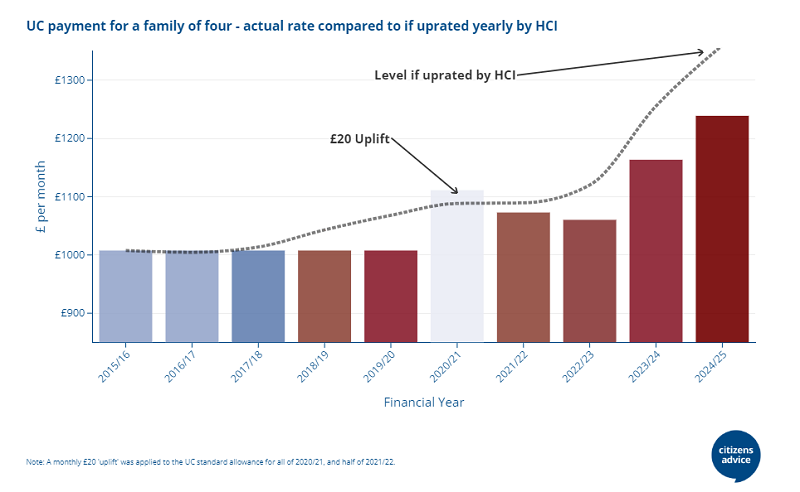
- What will it take to turn the tide
With a general election on the horizon, four in five voters say negative budgets are an important issue.* Any new government will have tough decisions to make in terms of spending, so they’ll need to prioritise interventions that are the most effective. Our insights allow us to compare the impact of different interventions on the number of households who are in a negative budget - how many people will be lifted out of the red and into the black.
Giving security to the millions living on empty will be a generational challenge, but we’ve identified a range of measures that any government could start implementing straight away to lift 1.1 million people out of a negative budget. They wouldn't completely reverse the problems we've seen, but would start to make some genuine progress towards changes for the long term:
-
Legislate to uprate working-age benefits using inflation data from the Household Costs Indices, so they better reflect the true cost of living for low-income households. Restoring benefits to what they would be if they’d been uprated by the relevant HCI rate since 2015 would lift over 200,000 households - or 480,000 people - currently on means-tested benefits out of a negative budget.
-
Keep increasing the National Minimum Wage so more people in work can be lifted out of a negative budget. If the NMW was raised to the level of the real living wage, it would lift over 80,000 households out of a negative budget.
-
Improve energy bill support by expanding eligibility for the Warm Home Discount and increasing support for those with the greatest energy needs. The tiered model we’ve developed would lift 97,000 households out of a negative budget and reduce the budget shortfall for millions of others.
-
Ensure affordable access to essential markets through social tariffs for water, broadband and motor insurance. Social tariffs for water, broadband and motor insurance would stop households being priced out and the models we propose would lift 72,000 households out of a negative budget.
-
Reform the Local Housing Allowance so it better supports people with high private rent costs. LHA is set to be frozen again from 2025 - and the gains made in April 2024 will soon be lost. At the very least, LHA needs to be permanently attached to the 30th percentile of local rents.
Footnotes
[1] All figures in the National Red Index are for England, Scotland, and Wales only. The overall negative budget figure, including the figure for children, and the number of people ‘living on empty’ has been calculated using the inflation rate from the Household Costs Indices. All other figures have been calculated using the inflation rate from the Consumer Price Index.
See section 2 of the report for further details.
[2] To calculate the number of people in a negative budget, we multiplied the number of households in a negative budget (using figures from the National Red Index) by the ONS estimate for the
average household size (2.36). To calculate the number of children in a negative budget, we multiplied the number of households with dependent children in a negative budget (using figures from the National Red Index) with the latest ONS data for the
average number of dependent children per family in England and Wales (which we believe is a reasonable proxy for the average number of dependent children per family in the UK). As such, our figure for the number of children in a negative budget 1.5 million, only includes dependent children.
*Voter survey data based on a representative poll of 10,100 adults (18+) in the UK conducted by Opinium for Citizens Advice, fieldwork conducted between the 20th of December 2023 to 6th of January 2024.
Published 16 April 2024.

 In Wiltshire around 1 in 20 people are in a negative budget.
In Wiltshire around 1 in 20 people are in a negative budget.